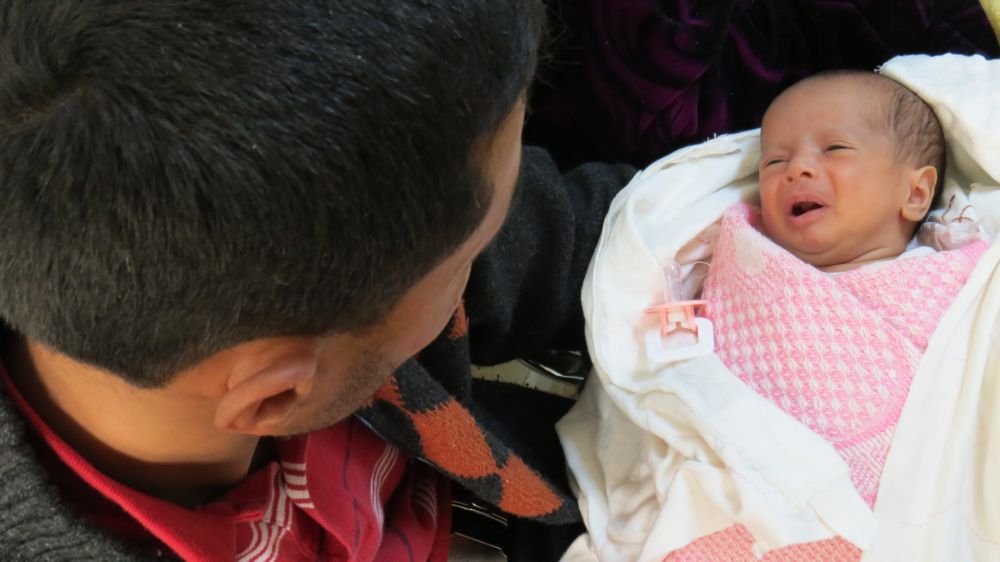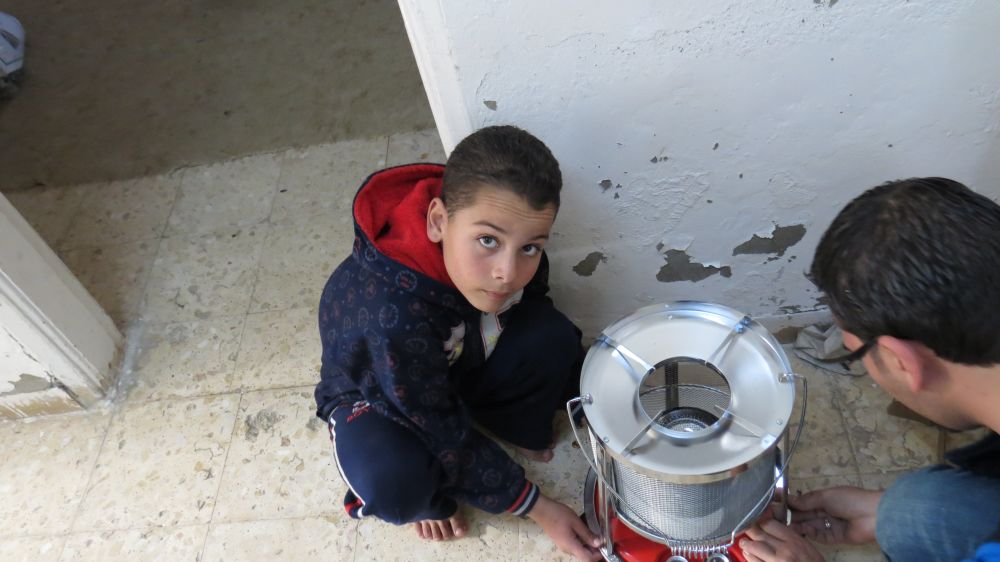
A Syrian refugee at an informal education class run by Caritas Jordan in Zarqa. All photos Patrick Nicholson/Caritas
By Patrick Nicholson
“Each Syrian you meet will tell you a different story; but they are all the same tragedy,” said Fawaz, a refugee who crossed into Jordan last month.
Since the conflict began two years ago in Syria, its cities have been devastated, its people go hungry, living in fear, 70,000 are dead and around 3 million have been forced from their homes.
Half of the Syrian refugees who have fled their country are in Jordan. Most live in urban areas in rented rooms. Caritas Jordan provides them with humanitarian aid, housing support, healthcare, education and counseling.
Here are five of their stories.
Fawaz
Fawaz cradles his 20-day old baby girl in his arms as they wait at the Caritas clinic in Amman. The baby has a high fever and has been born with a hip problem. Thankfully her twin brother is healthy and happy. The twins were born just days after Fawaz and his wife made the dangerous crossing into Jordan from Syria in January.
They had been running from hideout to hideout inside Syria for 6 months after they witnessed the massacre of 40 relatives in Hama. All the members of his aunt’s family were killed. “They were caught in a crossfire,” he said. His village is a ghost town, its 7000 residents all gone. “In Syria, there is only death now,” said Fawaz.
“As we were expecting twins, a doctor advised us that we would probably need an incubator,” he said. “The hospitals are not functioning. It’s too dangerous to try to reach them. So when I found my name was not on the wanted list, we came to Jordan.”
Fawaz, his wife, the twins, his mother and sister live in a tent he has built from four wood sticks and bits of cloth on wasteland. “It’s like 150 years ago,” he said. They have no heater, only wood to burn. “It is very cold,” he said. “And the smoke from the fire makes the babies ill.”
As well as receiving medical care through the clinic, his family have also been registered by Caritas staff members to receive humanitarian aid like a heater and vouchers to buy food, blankets, warm clothing and fuel. “I don’t know what will happen to us next,” said Fawaz. “We thought the crisis would be over in a month. It’s now been two years.”
Zarfeh
Zarfeh Shibleyh has just received a new heater from Caritas and vouchers which she has bought blankets with. She lives in the Jordanian town of Mafraq with eight of her children. Two of the older boys and her husband remain in Syria, their whereabouts unknown. Their photos are at the centre of a heart collage on one of the walls.
“We had to get the children out because it had become too dangerous,” she said. They left Aleppo in December 2012 with only the clothes on their backs. “I brought nothing of value, except my children. There is nothing more precious than that.” Her parents fled to Lebanon.
She registered with Caritas to receive aid, but life is still tough. To earn enough money to pay rent, the teenage children must work. They leave home at 5am for a long day’s labour, of which they receive 2 Jordanian dinars, around three dollars. Rent is 150 dinars a month.
“They are losing their education,” she said. “But what can we do. We have to pay rent.”
Rosan
“I cannot describe my daily life. It is empty” said Rosan Kurdi, a Syrian refugee in Amman. “I have nothing. I have no food to cook with. I have no friends. My husband is trapped in Syria. Apart from my child, I’m completely alone.”
She lives with her small boy in a tiny, dilapidated room in a Palestinian refugee camp in the city. Jordan is home to many waves of refugees, especially Palestinians and Iraqis. She doesn’t know anyone in the neighbourhood. Sometimes a relative comes to babysit, so she can go out to look for work.
Without a husband or family to provide income or childcare, Rosan must rely on Caritas. “I received many things. Vouchers for the clothes and shoes you see my child wearing. Medicine for him. And food and blankets. Without Caritas, I’m isolated,” she said.
She has lost almost all of her hope. “Only the welfare of my child gives me the strength to carry on,” she said. “He has had a very tough life, a life with no dignity. My only dream is that the boy will return one day to Syria. Nobody should have to grow up outside their own country.”
Halabia
“Our house was destroyed by bombs,” said Halabia Althaner. “One of our children died in the attack. Two more are missing after they went outside. My husband had a series of strokes as a result.
“We searched everywhere for the children. But our neighbours told us that we must give up. If they were alive, they would have turned up.”
Halabia is suffering from severe headaches. She is waiting for treatment in the Italian Hospital in Amman. Caritas refers cases there from its clinics across the country.
She lives with her husband and seven of her remaining children. “It is very difficult. We can’t afford for them to study. We don’t have the money. But at least we live in peace and security.”
Mohammad
“It’s agony to see my beloved Homs destroyed,” said Mohammad Azroun, who fled the Syrian city last Spring and is now in Madaba, Jordan. “At first we thought we could handle it, but then the bombs and destruction increased. We fled to Damascus, but the pattern started to repeat itself, so we left Syria.”
He arrived in Jordan five months ago with his family. “ When you first arrive, you are in complete shock. You are mentally and physically tired from the journey. You are in a weird environment where everyone is a stranger.”
Mohammad received help just four days after coming to Madaba. Caritas provided hygiene kits with things like soap, tooth brushes and nail clippers inside, as well as blankets, heaters, and vouchers for food and fuel. “Also we support each other,” said Mohammed. “We are four families living in the same house, and we look after each other.”
Rent for lodgings is one of the biggest challenges, and for that Mohammad must look for work. He is optimistic and tells his young children things will get better. “I tell them that our lives will return to how they were and one day we will be able to go home.” he said. “Syria doesn’t deserve this. Please save Syria. Tell everyone in the world to help Syria.”





